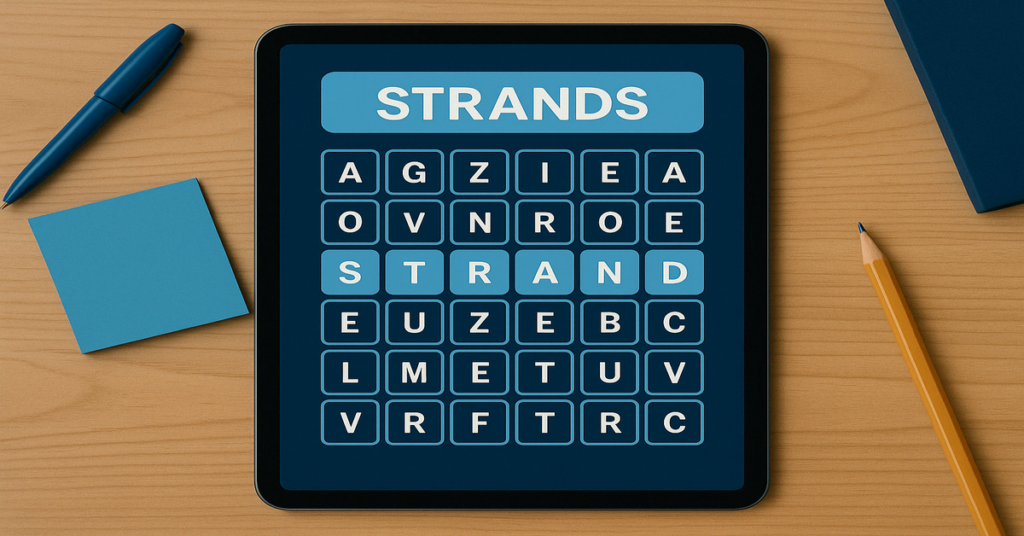In the vast world of digital word games, few publications command as much respect and admiration as The New York Times. Known for its classic Crossword and viral Wordle sensation, the Times recently introduced a new linguistic challenge: Strands. This engaging daily puzzle quickly became a favorite among language enthusiasts. To help both beginners and experienced players navigate the game’s unique structure, this guide offers in-depth explanations, strategic advice, and valuable Strands hints that enhance the gameplay experience.
What Is the NYT Strands Game?
Overview
Strands is a daily word puzzle released by The New York Times. It’s part of the NYT Games collection, which also includes Wordle, Spelling Bee, Letter Boxed, and the Mini Crossword.
Objective
Players are tasked with finding themed words hidden in a grid of letters. Unlike other word search puzzles, Strands adds a twist with a hidden central word—known as the spangram—that relates to the theme and spans across the entire grid.
How to Play Strands
The Grid
- The puzzle presents a grid, usually 6×8 letters.
- All words are arranged horizontally, vertically, or diagonally.
- Words are connected letter by letter—there are no backward or non-contiguous connections.
The Theme
Each puzzle provides a daily theme or title, which serves as a clue for the kinds of words you should find.
The Spangram
This is a unique, longer word that touches two opposite sides of the grid and connects the theme. Finding the spangram often opens up the board significantly.
Scoring
There’s no scoring system in the traditional sense. Instead, the satisfaction comes from solving the puzzle completely.
Types of Words in Strands
Themed Words
These relate directly to the day’s puzzle title. For example, if the theme is “Kitchen Essentials,” you might find words like “spoon,” “oven,” or “whisk.”
Non-Themed Words
These can also be found, but they don’t contribute to the final puzzle solution.
Bonus Words
Sometimes, extra (non-theme) words are hidden in the grid. While not necessary for completion, they can be fun to find.
Where to Find Strands Hints
Official NYT Games App
- Each puzzle starts with a theme, which acts as your first hint.
- The app occasionally offers nudge hints if players are stuck for a long time.
NYT Games Social Media
The Times shares daily hints, solving tips, and discussions on platforms like X (formerly Twitter) and Facebook.
Puzzle Blogs and Forums
Websites like Reddit’s r/nytpuzzles and dedicated puzzle blogs provide daily walkthroughs and hints without revealing the full answers.
Strategies for Solving Strands
Step 1: Understand the Theme
Always begin by analyzing the puzzle’s title—it’s your roadmap.
Step 2: Scan for Obvious Words
Look for short, easy-to-spot words. These help open up the board.
Step 3: Use the Corners
Corners often hide starting letters of long words. Trace outwards from each edge.
Step 4: Focus on the Spangram
Finding the spangram early can reveal the structure of the puzzle.
Step 5: Use Letter Combinations
Look for common prefixes and suffixes like “pre,” “ing,” or “tion.”
Common Challenges in Strands
The Misleading Theme
Sometimes, the puzzle title is metaphorical or abstract. Think broadly and creatively.
Diagonal Words
These are harder to spot than horizontal or vertical ones. Train your eye to move diagonally.
Grid Saturation
Too many found words can clutter the grid. Consider using a reset option to clear the view.
Daily Routine and Mental Benefits
Cognitive Training
Playing Strands regularly improves:
- Vocabulary
- Pattern recognition
- Focus and memory
Stress Relief
Like other word puzzles, Strands provides a calming yet stimulating mental break.
Routine Building
Many players incorporate Strands into their daily routine alongside their morning coffee or evening wind-down.
Comparing Strands with Other NYT Games
| Feature | Strands | Wordle | Spelling Bee | Mini Crossword |
|---|---|---|---|---|
| Clue-Based? | Yes (thematic) | No | No | Yes |
| Grid Format | Yes | No | No | Yes |
| Multiplayer | No | No | No | No |
| Length | Medium | Short | Long | Short |
| Strategy Level | Medium-High | Medium | High | Medium |
Tools to Enhance Strands Play
Vocabulary Apps
Apps like Merriam-Webster, Wordnik, and Vocabulary.com can expand your word knowledge.
Word Search Tools
Online tools like WordFinder or Lexipedia can be used to simulate solving techniques (avoid for cheating).
NYT Games Subscription
- Grants full access to Strands and other games.
- Enables streak tracking, puzzle archives, and app syncing.
Advanced Tips from Seasoned Players
Practice Diagonal Scanning
Train yourself to see diagonal words by using puzzles that focus on diagonal word formation.
Think Abstractly
Not all themes are literal. “Back to School” may include “chalk” and “quiz” but also “alarm” and “bus.”
Spangram First Strategy
Some players prioritize finding the spangram early to get a jump on identifying key word paths.
Reverse Engineer Words
Sometimes, it’s easier to work backward from a known suffix or prefix to complete a full word.
Cultural Relevance and Popularity
Viral Growth
strands Hints has seen rapid growth, especially among millennials and Gen Z puzzle solvers.
Educational Use
Teachers incorporate it into classroom activities to build vocabulary and critical thinking.
Puzzle Communities
Online forums and Discord servers have formed to discuss Strands and other NYT puzzles in real-time.
Accessibility and Availability
Platforms
Strands is available through:
- NYT Games website
- NYT Games mobile app (iOS and Android)
Accessibility Features
- Dark mode
- Adjustable grid size (coming soon)
- Hint toggling
Future of Strands
Game Evolution
Expect:
- Themed weeks
- Multiplayer versions
- In-game achievements
AI Integration
Possible hints powered by AI to offer custom nudges without revealing answers.
Globalization
International versions with translated themes and culturally specific words may emerge.
Conclusion
strands Hints is a compelling addition to the New York Times’ puzzle portfolio. With its unique blend of logic, vocabulary, and theme recognition, it stands out as both a challenge and a delight for word lovers. Whether you’re aiming to keep a daily streak or just dip in occasionally for some cognitive stimulation, Strands offers depth, flexibility, and endless enjoyment.
By using hints strategically, training your pattern recognition skills, and embracing the game’s creative themes, you’ll quickly become adept at unraveling each puzzle’s secrets. Happy puzzling!
FAQs
1. What is the best strategy for finding the spangram in Strands?
Look at edge letters and explore long, thematic words that could span the grid.
2. Where can I get Strands hints without full spoilers?
Reddit, Wordplay (NYT blog), and puzzle-specific forums often offer subtle hints without revealing answers.
3. Can you replay old Strands puzzles?
Not currently, but archived puzzles may be available to NYT Games subscribers in the future.
4. Are there any penalties for incorrect words in Strands?
No, you can guess freely. The game does not penalize wrong guesses.
5. Do you need a subscription to play Strands?
You can try some puzzles for free, but full access requires a NYT Games subscription.
6. Is Strands suitable for children or ESL learners?
Yes! The game helps improve vocabulary and logic skills and can be adapted for educational use.






